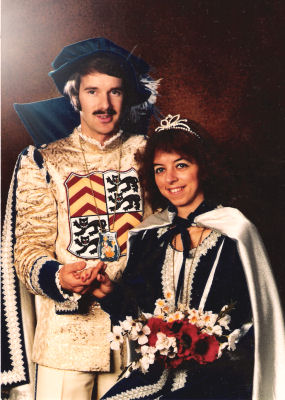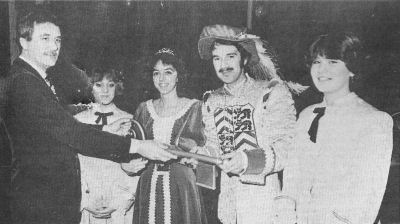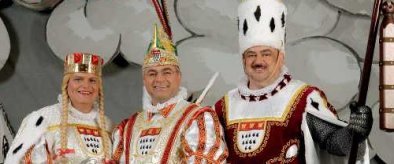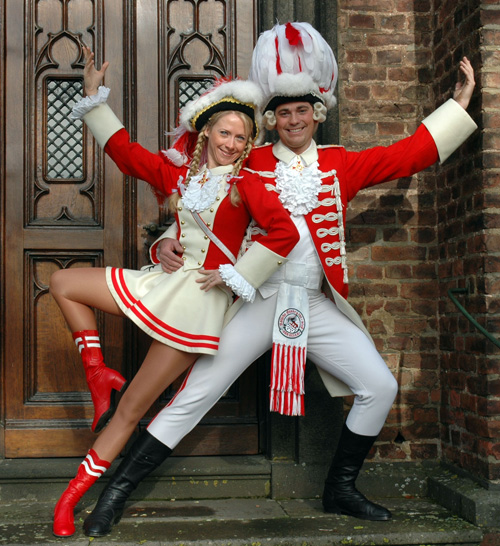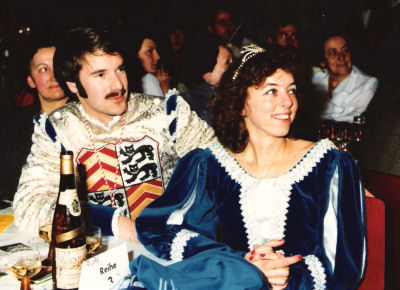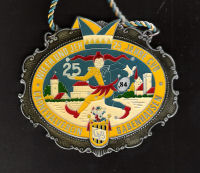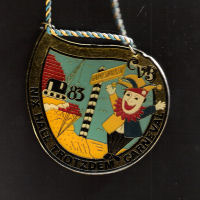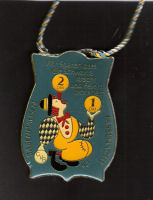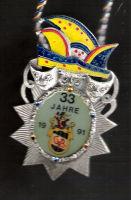|
Different areas of Germany celebrate carnival, or Fasching, different. Fasching is the time from November 11, 11 minutes past 11 (11.11 11:11), until Ash Wednesday. It is a combination of political satire and the traditional chasing out of winter. Many of you may be familiar with the carnival in Rio de Janeiro or Mardi Gras.
Why is the "11" so important for the German carnival? During the time of Napoleon, the French motto was "Egalit, Legalität, Fraternität" (sorry, I have no idea how it's spelled) and if you take the first letter of each word, it spells "elf" the German word for eleven. The speeches were secret "messages", thus the political satire. This is the "offical" information from the Cologne carnival homepage:
Carnival has been celebrated in the
City of Cologne since time immemorial. However, after the French
Revolutionary troops left Cologne in 1814 and the Prussians took over,
it was high time to "organise" the street carnival which, the new
authority felt, was getting out of hand.
|
|
In Babenhausen, where I lived at the time, a tradition was to have a couple represent them during the Faschng season as Prince and Princess. In the season 1981 / 1982 my husband and I were selected as the towns Fasching Prince Michael I. and Princess Dorrie I.
On November 7, 1981, we were announced as the new prince and princess.
|
|
Ash Wednesday was February 24, thus making my 22 birthday fall on Fasching Tuesday. We were also married 22 years, making us the "perfect" Fasching royals.
Our costumes were selected from the great sortment of the theators in Frankfurt. We were the first couple to introduce the cities shield on the front of the princes' costume.
One of our first duties was to organize a big reception for all the carnival and city VIP'S of Babenhausen. Together with the help of my dance group and other friends we put together what I consider one of the best receptions that were ever done... and I'm not just bragging!
receiving the key to the city
|
|
In other cities they may not have a prince and princess. In Cologne for example they have the "Dreigestirn", 3 men dressed as the "Prince", the "Bauer" (Farmer), and the "Jungfrau" (Virgin), who is actually a man dressed as a woman.
Dreigestirn, Cologne 2009
In earlier times, women were not allowed to take part in the festivities, at least not on stage. The only real woman was the "Tanzmariechen" or "Funkenmariechen", or marching girl, who wears a uniform styled outfit with a very short skirt. She would march in with the marching men, all dressed in old-fashioned military uniforms, and perform either a solo dance or a duet with a partner.
Today there are "Funkenmariechen" competitions, both soloists and whole groups.... a very colorful and talented treat.
|
|
"Sitzungen" and Masquerade balls
|
|
The biggest events were the "Sitzungen", stage shows with all sorts of acts, from marching girls, singing, dance shows, more singing, fun speeches (usually politcal satires), etc. In some parts of Germany, like in Mainz and Frankfurt, the audience dress in long evening gowns and tuxedos. But in the real FUN cities, like Cologne, the audience dress up in all sorts of colorful costumes.
|
|
Michael and I at one such "Sitzung"
Many masquerade balls also take place with lots of dancing, often with a partner you don't know because of the costume, and LOTS of drinking and flirting.
|
|
The highlight
of the Fasching/Carnival season is happens on the days from the Thursday
before Ash Wednesday until the Tuesday before. The Thursday is reserved
for the women. Any man caught wearing a tie on that day gets that cut
off, as a symbol for.... well, I won't elaborate.
The larger cities will usually have their parades on Saturday or Sunday, for business/commercial, as well as traffic reasons, with the exception of Cologne which has it's parade on the Rose Monday, as mentioned above. Other towns and villages will have theirs also on Monday or Tuesday. Since many marching bands and groups are asked to be in many different parades, spreading the parades over different days makes that possible.
|
|
1983 / 1984 |
|
Wie eh und jeh, 25 Jahre CVB |
|
1982 / 1983 |
|
Nix Hall, trotzdem Carneval |
|
1981 / 1982 |
|
Wir sparen dass die Schwarte kracht,
und feiern trotzdem Fessenacht |
|
1980 / 1981 |
|
33 Jahre CVB |
up-date: 03.02.2012
